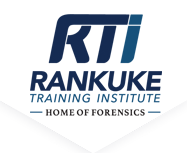
Rankuke Training Institute Leading the way...
T (+267) 390 7042
Cell: (+267) 7314 4144
Email: Email: info@rti.ac.bw
Rankuke Training Institute
Plot 51406 Kgaleview, Diratsame Mosielele Rd, Gaborone

- Undergraduate Degree and above or;
- 5 five years’ experience in investigation related field.
 Legal Aspects of Digital Forensics & Global Approach
Legal Aspects of Digital Forensics & Global Approach- Computer Hardware
- File Systems
- Disks and Storage Media
- Digital Evidence- Foundations
- Managing Digital Evidence
- Boot Process: Windows, Linux, and Macintosh
- Mobile Devices Forensics
- Acquiring, Process and Presentation of Digital Evidence
- Forensic Investigation Theory
- Processing Evidence
- Presenting Evidence
- Forensic Models, Appliances and Protocols
- Cryptography, Password Cracking and Steganography
- Lab Protocols
- Digital Forensic Practical’s

Part-time
Our part-time course is flexible for busy professionals. We offer classes in the evenings from 18:00hrs to 20:00hrs or on Saturdays from 08:00hrs to 16:00hrs. This mode of study takes 6 months with a minimum class attendance threshold of 75%
Online Study: We offer the option of online study to those who chose a more interactive mode of learning. Online study type is executed along with part-time study classes for completion in 6 months.

For part-time students: Exams are delivered four-times a year meaning part-time students are eligible to write their exams every 3 months or twice during the period of study.
Upon successful completion of all written exam’s students are required to apply for membership with the IICFIP.
Upon the successful completion of this course, participants will be able to:
- Identify pertinent electronic evidence in the context of violations of specific laws; those that deal with computer and related crimes, also referred to as cyber laws or technology crime laws.
- Locate and recover relevant electronic evidence from different platforms and Operating Systems using a variety of tools.
- Identify and articulate probable causes that may be necessary to obtain a warrant to search and seize electronic artifacts and recognize the limits of such warrants.
- Recognize and maintain a chain of custody of electronic evidence.
- Follow a documented forensics investigation process covering the end-to-end digital forensics life cycle.
- IT Technicians
- Network Engineers
- Law enforcement/Military
- Systems engineer
Student Membership: All registered students professional courses fall under this category until they become fully certified and then move to the Accredited Members Category. Student members enjoy discounts at workshops and conference like accredited members but cannot vote at the general meetings or be elected as Forum or Chapter leaders.
Accredited Membership: These are fully qualified CDFP’s. Upon completion of the courses, students will be required to apply for membership at a fee of P2500.00 renewable every 3 years
They are the ones who are elected as leaders of Forums and Chapters.
They are the ones that have the right to attend and vote at the Forums and chapters meetings.
